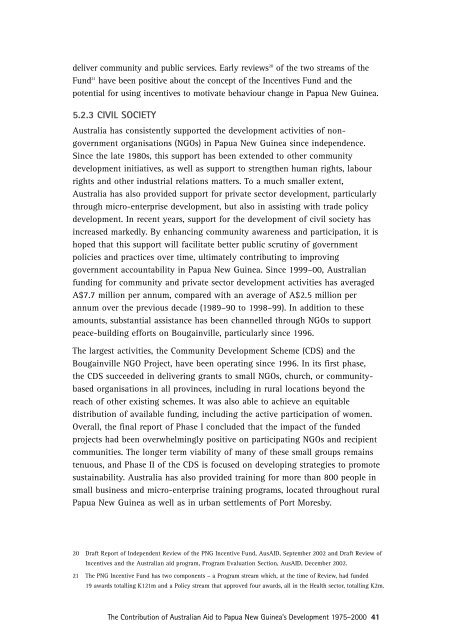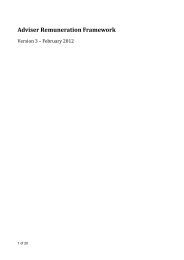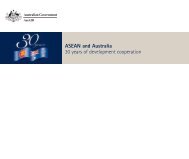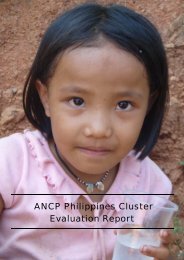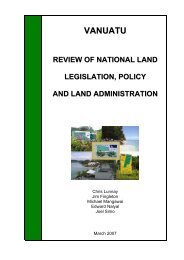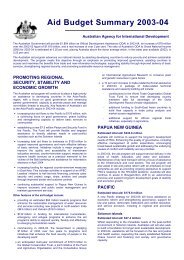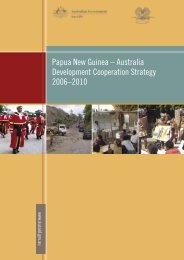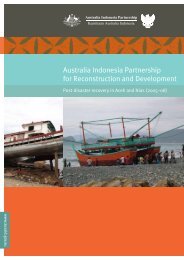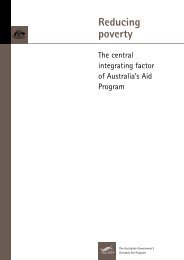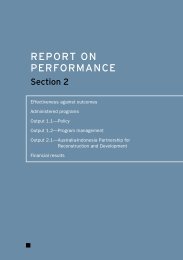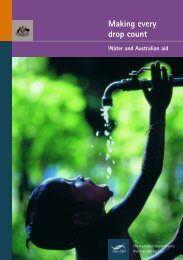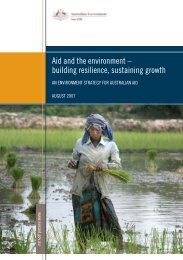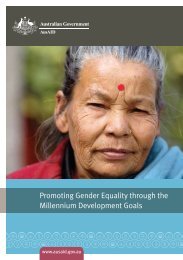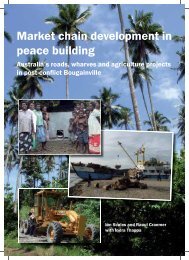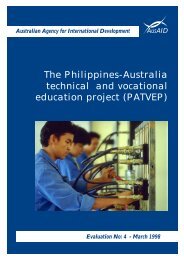Australian Aid to PNG - AusAID
Australian Aid to PNG - AusAID
Australian Aid to PNG - AusAID
You also want an ePaper? Increase the reach of your titles
YUMPU automatically turns print PDFs into web optimized ePapers that Google loves.
deliver community and public services. Early reviews 20 of the two streams of theFund 21 have been positive about the concept of the Incentives Fund and thepotential for using incentives <strong>to</strong> motivate behaviour change in Papua New Guinea.5.2.3 CIVIL SOCIETYAustralia has consistently supported the development activities of nongovernmen<strong>to</strong>rganisations (NGOs) in Papua New Guinea since independence.Since the late 1980s, this support has been extended <strong>to</strong> other communitydevelopment initiatives, as well as support <strong>to</strong> strengthen human rights, labourrights and other industrial relations matters. To a much smaller extent,Australia has also provided support for private sec<strong>to</strong>r development, particularlythrough micro-enterprise development, but also in assisting with trade policydevelopment. In recent years, support for the development of civil society hasincreased markedly. By enhancing community awareness and participation, it ishoped that this support will facilitate better public scrutiny of governmentpolicies and practices over time, ultimately contributing <strong>to</strong> improvinggovernment accountability in Papua New Guinea. Since 1999–00, <strong>Australian</strong>funding for community and private sec<strong>to</strong>r development activities has averagedA$7.7 million per annum, compared with an average of A$2.5 million perannum over the previous decade (1989–90 <strong>to</strong> 1998–99). In addition <strong>to</strong> theseamounts, substantial assistance has been channelled through NGOs <strong>to</strong> supportpeace-building efforts on Bougainville, particularly since 1996.The largest activities, the Community Development Scheme (CDS) and theBougainville NGO Project, have been operating since 1996. In its first phase,the CDS succeeded in delivering grants <strong>to</strong> small NGOs, church, or communitybasedorganisations in all provinces, including in rural locations beyond thereach of other existing schemes. It was also able <strong>to</strong> achieve an equitabledistribution of available funding, including the active participation of women.Overall, the final report of Phase I concluded that the impact of the fundedprojects had been overwhelmingly positive on participating NGOs and recipientcommunities. The longer term viability of many of these small groups remainstenuous, and Phase II of the CDS is focused on developing strategies <strong>to</strong> promotesustainability. Australia has also provided training for more than 800 people insmall business and micro-enterprise training programs, located throughout ruralPapua New Guinea as well as in urban settlements of Port Moresby.20 Draft Report of Independent Review of the <strong>PNG</strong> Incentive Fund, <strong>AusAID</strong>, September 2002 and Draft Review ofIncentives and the <strong>Australian</strong> aid program, Program Evaluation Section, <strong>AusAID</strong>, December 2002.21 The <strong>PNG</strong> Incentive Fund has two components – a Program stream which, at the time of Review, had funded19 awards <strong>to</strong>talling K121m and a Policy stream that approved four awards, all in the Health sec<strong>to</strong>r, <strong>to</strong>talling K2m.The Contribution of <strong>Australian</strong> <strong>Aid</strong> <strong>to</strong> Papua New Guinea’s Development 1975–2000 41


